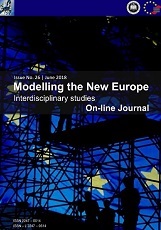Visegrad Euroscepticism: Discursive nodal Points in Eurosceptic Discourses surrounding External Actions of the European Union
Visegrad Euroscepticism: Discursive nodal Points in Eurosceptic Discourses surrounding External Actions of the European Union
Author(s): Filip TereszkiewiczSubject(s): EU-Approach / EU-Accession / EU-Development, Sociology of Politics
Published by: Facultatea de Studii Europene -Universitatea Babeş-Bolyai
Keywords: Constructivism; Euroscepticism; EU`s external action; Visegrad; far-right;
Summary/Abstract: Increasing support for Eurosceptic parties and movements can be observed in the European Union’s (EU) member states since 2009, when the economic crisis heavily affected the continent. This process has happened also within Central and Eastern European countries, especially in Poland, the Czech Republic, Slovakia and Hunga-ry (collectively referred to as the Visegrad Group countries, or V4 for short). The goal of this paper is an analysis of far-right Eurosceptic politicians and their atti-tudes towards EU external actions. Using the Thomas Diez concept of discursive no-dal points (DNPs) and examining European Parliament (EP) debates, literature about V4 Euroscepticism and media reports, this paper attempts to give answers about their attitudes to aspects of EU external actions. First, the notion of Euroscep-ticism is examined and the main difficulties with the definition are briefly discussed. Then, the methodology of this research and the concept of DNPs are laid out. The following section pays attention to V4 Eurosceptic politicians’ (V4E) attitudes to-wards five areas of EU external actions: EU-Russia relations, EU defence policy, en-vironmental policy, development assistance policy, and the Transatlantic Trade and Investment Partnership (TTIP) issue. In the conclusion, the author summarises that V4 Eurosceptics are divided in their positions towards EU external actions. Pa-radoxically, they are linked not in the being in opposition towards the EU, but rather in having pro-Russian attitudes and being against any EU activity that would violate Kremlin’s interests.
Journal: Online Journal Modelling the New Europe
- Issue Year: 2018
- Issue No: 26
- Page Range: 144-168
- Page Count: 25
- Language: English

